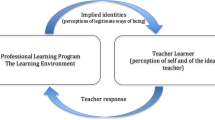Abstract
The present study explores the experience of two young Gypsy girls in solving school arithmetic tasks in interaction with an adult who supports their participation. Along with learning the use of arithmetic tools, a basic element concerning the experience of the two girls as they try to gain entry into the school practice is learning about developing relevant ‘learning identities’. Analysis of the girls’ interaction with an adult identifies that the type of ‘learning identities’ required involve at least two dimensions: (a) learning to value the use of formal arithmetic tools, and (b) learning about relevant ways of behaving in the school mathematics practice.
Résumé
L’étude explore l’expérience de deux jeunes gitanes lors de la résolution de tâches arithmétiques en interaction avec un adulte qui les soutient. En plus de l’apprentissage d’outils arithmétiques, éléments essentiels pour l’entrée des deux jeunes dans la pratique scolaire, il s’agit aussi pour elles de dévelloper des ‘identités d’apprenantes’. L’analyse des interactions des jeunes avec l’adulte montre que les types ‘d’identités d’apprenantes’ dont elles on besoin concernent au moins deux dimensions: (a) apprendre à valoriser l’utilisation d’outils arithmétiques formels, et (b) apprendre des façons d’agir pertinentes pour les pratiques mathématiques scolaires.
Similar content being viewed by others
References
Abreu, G. de (1993).The relationship between home and school mathematics in a farming community in rural Brazil. Unpublished doctoral dissertation. Cambridge, UK: University of Cambridge.
Abreu, G. de (2002). Towards a cultural psychology perspective on transitions between contexts of mathematical practices. In G. de Abreu, A.J. Bishop, & N.C. Presmeg (Eds.),Transitions between contexts of mathematical practices (pp. 173–192). Dordrecht, The Netherlands: Kluwer Academic Publishers.
Abreu, G. de, Bishop, A.J., & Presmeg, N.C. (Eds.). (2002).Transitions between contexts of mathematical practices. Dordrecht, The Netherlands: Kluwer Academic Publishers.
Apple, M. (1995). Taking power seriously: New directions in equity in mathematics education and beyond. In W.G. Secada, E. Fennema, & L.B. Adajian (Eds.),New directions for equity in mathematics education (pp. 329–349). Cambridge: Cambridge University Press.
Chronaki, A. (2000). Teaching maths through theme-based resources: Pedagogic style, ‘theme’ and ‘maths’ in lessons.Educational Studies in Mathematics 42, 141–163.
Chronaki, A. (2003a). Argumentation and Roma children — The move from personal embodiments to mathematical thinking. In D. Chasapis (Ed.),Argumentation and proof in school mathematics (pp. 159–177). AUT Press.
Chronaki, A. (2003b).Developing mathematical learning as mastering new tools and entering new discourses: Some thoughts on a very complex process. Paper presented to the conference of EARLI, Padova, Italy, August.
Chronaki, A. (2004). Researching the school mathematics culture of ‘others’ — Creating a self-other dialogue. In R. Zevenbergen & P. Valero (Eds.),Researching the socio-political dimensions of mathematics education: Issues of power in theory and methodology (pp. 145–166). Dordrecht, The Netherlands: Kluwer Academic Publishers.
Dowling, P. (1998).The sociology of mathematics education: Mathematical myths. London: The Falmer Press.
Gotovos, A. (2002).Education and other — Issues of a multicultural pedagogy, Athens: Metaixmio.
Lacey, C. (1976). Problems of sociological fieldwork: A review of the methodology of the hightown grammar. In M. Shipman (Ed.),The organisation and impact of social research (pp. 63–88). London: Routledge & Kegan Paul.
Lydaki, A. (1998).Tsiganes in the city: A study of the area of St. Barbara. Athens: Kastaniotis.
Liegeois, J.P. (1994).Roma, Tsiganes, Voyageurs. Luxemburg: Conseil de l’Europe.
Luria, A.R. (1976).Cognitive development: its cultural and social foundations. Cambridge, MA: Harvard University Press.
Moscovici, S. (1998). The history and actuality of social representations. In U. Flick (Ed.),The psychology of the social (pp. 209–247). Cambridge: CUP.
Secada, W.G., Fennema, E., & Adajian, L.B. (1995).New directions for equity in mathematics education. Cambridge: Cambridge University Press.
Sfard, A. (2001). There is more to discourse than meets the ears: Learning from mathematical communication things that we have not known before.Educational Studies in Mathematics 46, 13–57.
Sfard, A., & Lavi, I. (2003) Sameness that makes the difference: Why can’t children see as the same what grownups can’t see as different? In T. Triantafilidis, C. Chatsikiriakou, P. Politis, & A. Chronaki (Eds.),Proceedings of the 6th National Conference on Mathematics Education. Volov, Greece: University of Thessaly.
Stathopoulou, C. (2003).Cultural context and the teaching and learning of mathematics: A study of a Gypsy school classroom and their community. Unpublished PhD Dissertation. Rhodes, Greece: University of Aegean.
Tajfel, H. (1978). Social categorisation, social identity and social comparison. In H. Tajfel (Ed.),Differentiation between social groups: Studies in social psychology of intergroup relations (pp. 61–76). London: Academic Press.
Tsiakalos, G. (1998). Social exclusion: Definitions, context and meanings. In S. Kassimati (Ed.),Social exclusion in Greece (pp. 39–65). Athens: Gutenberg.
Vygotsky, L.S. (1978).Mind in society: The development of higher psychological processes. Cambridge, MA: Harvard University Press.
Walkerdine, V. (1988).The mastery of reason: Cognitive development and the production of rationality. London: Routledge.
Wenger, E. (1998).Communities of practice: Learning, meaning and identity. New York: Cambridge University Press.
Yackel, E., & Cobb, P. (1996). Sociomathematical norms, argumentation, and autonomy in mathematics.Journal for Research in Mathematics Education, 27(4), 458–477.
Author information
Authors and Affiliations
Rights and permissions
About this article
Cite this article
Chronaki, A. Learning about ‘learning identities’ in the school arithmetic practice: The experience of two young minority Gypsy girls in the Greek context of education. Eur J Psychol Educ 20, 61–74 (2005). https://doi.org/10.1007/BF03173211
Received:
Revised:
Issue Date:
DOI: https://doi.org/10.1007/BF03173211




